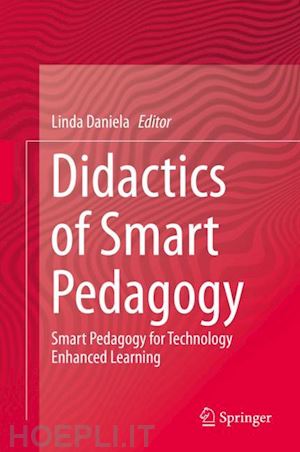
Questo prodotto usufruisce delle SPEDIZIONI GRATIS
selezionando l'opzione Corriere Veloce in fase di ordine.
Pagabile anche con Carta della cultura giovani e del merito, 18App Bonus Cultura e Carta del Docente
The focus on smart education has become a new trend in the global educational field. Some countries have already developed smart education systems and there is increasing pressure coming from business and tech communities to continue this development. Simultaneously, there are only fragmented studies on the didactic aspects of technology usage. Thus, pedagogy as a science must engage in a new research direction—smart pedagogy. This book seeks to engage in a new research direction, that of smart pedagogy. It launches discussions on how to use all sorts of smart education solutions in the context of existing learning theories and on how to apply innovative solutions in order to reduce the marginalization of groups in educational contexts. It also explores transformations of pedagogical science, the role of the educator, applicable teaching methods, learning outcomes, and research and assessment of acquired knowledge in an effort to make the smart education process meaningful to a wide audience of international educators, researchers, and administrators working within and tangential to TEL.
Provisional Table of Contents for the volume:
In this chapter pedagogical principles will be provided for teaching and learning in transformative situations when there are no borders of time and space for learning. It will also provide ideas to ensure that the learning process is meaningful, what didactical principles can be used and how to evaluate a common core curriculum. Critical analyses of didactical principles which were used for previous generations will be discussed to provide insight into didactical principles which can still be used in a transformative educational environment.
This chapter will analyse learning theories from the perspective of emerging technology and technological solutions used in the educational process. It will critically discuss the learning principles used, learning outcomes and cognitive development in several learning theories: Active learning; Blended learning; Personalised learning; Adaptive learning; Project based learning; Assisted learning; Collaborative learning; Problem based learning; Experiential learning; Game based learning etc.
This chapter will explore developmental theories about different age groups to provide ideas for pedagogy to ensure cognitive development of learners in open educational environments rich with technologies and technological solutions. In an era when cognitive process are influenced by the possibility to access new information every moment, we require pedagogical solutions to provide age-appropriate learning. Some research shows that attention span is shortened and memory work load is significantly changed so this chapter will illustrate how to work with learners to provide metacognitive development in digital environments.
In this chapter there we will analyse knowledge construction principles for digital natives—those born in an environment full of technologies – sometimes also called generation 4.0, generation Z or the digital generation. We will examine knowledge construction principles according to ideas of Constructivism; Social constructivism; Neo-social constructivism; Constructionism
In this chapter we will discuss motivation theories in the sense of transformed educational processes. We will cover ideas on how motivation to learn can be ensured and how to construct knowledge when learners are responsible actors in these processes. It is well known that motivation is connected with self-esteem when positive reinforcements play a role to develop it. In this new pedagogical paradigm with changed principles of cognitive development and when learning processes are self-directed, motivation is mostly developed by learners themselves. This principle works for well-motivated learners but it doesn’t work for learners with developed avoidance motivation. There will be summarised ideas to motivate all learners to learn and construct their knowledge.
In this chapter there will be discussions about the challenges of sensor (motor) development in technology-enriched educational environments and ideas on how to use virtual technologies, wearables etc., to ensure that risks are diminished.











Il sito utilizza cookie ed altri strumenti di tracciamento che raccolgono informazioni dal dispositivo dell’utente. Oltre ai cookie tecnici ed analitici aggregati, strettamente necessari per il funzionamento di questo sito web, previo consenso dell’utente possono essere installati cookie di profilazione e marketing e cookie dei social media. Cliccando su “Accetto tutti i cookie” saranno attivate tutte le categorie di cookie. Per accettare solo deterninate categorie di cookie, cliccare invece su “Impostazioni cookie”. Chiudendo il banner o continuando a navigare saranno installati solo cookie tecnici. Per maggiori dettagli, consultare la Cookie Policy.